#why we sleep
Text
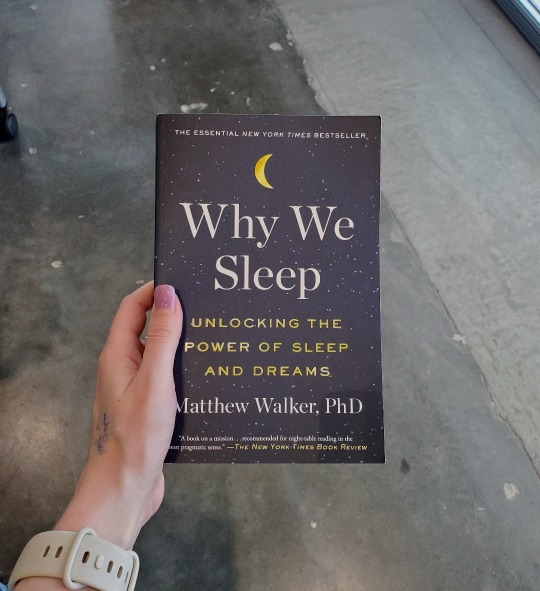
Also currently reading:
Why We Sleep by Matthew Walker
I'm not very far in this book yet, but it's been really approachable! I'm learning a lot, like why jet lag is worse in certain directions! And that some guys* decided to stay in a cave for 6 weeks to figure out circadian rhythms!
17 notes
·
View notes
Text
#book blog#booklr#poems#louise glück#thin air#michelle paver#the decagon house murders#yukito ayatsuji#why we sleep#matthew walker#house of leaves#mark z danielewski#books#book questions#book poll#reading#tbr#up next#poll
2 notes
·
View notes
Text
Review: Why We Sleep: Unlocking the Power of Sleep and Dreams by Matthew Walker, PhD
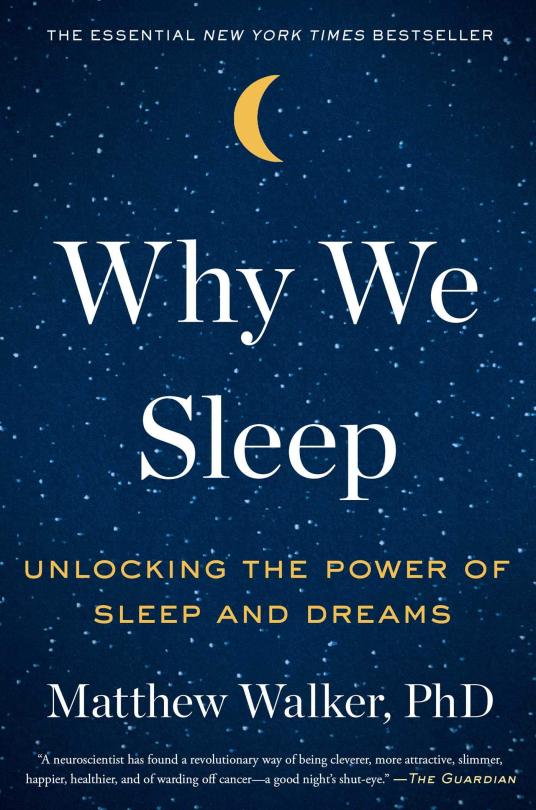
Book 3 of 2023
Start Reading Time: 3 February 2023
Finish reading Time: 30 March 2023
Page Count: 368 Pages
TRIGGER WARNINGS: DEATH, MEDICAL CONTENT, ANIMAL CRUELTY, CHRONIC ILLNESS, MENTAL ILLNESS
Hey, look! A nonfiction book! The first of the year!! Pretty big thing for me. Can you tell I struggled with this book by how long I spent reading it? It's been a while since I read a non-fiction book, but I hope I'll read more of it this year and it won't take as long.
I picked this book, of course, because I love sleep, but also because my Mom had trouble falling asleep and it negatively impacted her health. We even went to the doctor and she was prescribed some sleeping pills, which helped her sleep, but I don't know if it's good for her in the long run. So, I decided to read more about sleep, as I've never really got to know very much about it, and when you love something you'd make an effort to know more about it, right?
It just so happens that my uncle, my Mom's oldest brother, suffered a heart attack and a stroke earlier this month. When I went to visit him in the hospital he told me he could not get a wink of sleep since before the heart attack. I told him about this book I was reading at the time and gave him some tips to help him fall asleep from this book, and I think he really appreciated it. Now, I would recommend this book to all my loved ones or at least inform them of the importance of sleeping 7-8 hours every night.
I really do think that this needs to be taught in schools, as it is absolutely pivotal for everyone's health and all of our lives and the improvement of our society.
Some of the most fascinating things I learned from this book is about REM and NREM sleep, how and why we dream, how people have different circadian rhythms and that it is genetics, and basically just the amazing impacts on health that a sleep night could give us living beings. Even though I did find some of the parts of the book can be quite boring, it is still a really interesting and important book to read for everybody.
Also, some parts of the book can be quite grim and scary in the parts about the horrible things that come from lack of sleep. I felt personally attacked too, because I don't get 7+ hours of sleep regularly for no good reasons other than Netflix, Youtube, Twitter, and Tiktok exist. Also, sometimes it's because the books I'm reading were just so good that it makes me play this dangerous game of "just one more page" that could magically make 4+ hours of a few chapters feel like 5 minutes.
Overall, it's a great book that provides the readers with so much awesome knowledge about sleep, dreams, and just human health in general that could have greatly impacted the readers' health positively in the long run. Definitely an important read.
Here are my favorite quotes from the book:
"Hard problems care little about what motivates their interrogators; they meter out their lessons of difficulty all the same."
"The prefrontal cortex controls high-level thought and logical reasoning, and helps keep our emotions in check. When a night owl is forced to wake up too early, their prefrontal cortex remains in a disabled, “offline” state. Like a cold engine after an early-morning start, it takes a long time before it warms up to operating temperature, and before that will not function efficiently.
An adult’s owlness or larkness, also known as their chronotype, is strongly determined by genetics. If you are a night owl, it’s likely that one (or both) of your parents is a night owl. Sadly, society treats night owls rather unfairly on two counts. First is the label of being lazy, based on a night owl’s wont to wake up later in the day, due to the fact that they did not fall asleep until the early-morning hours. Others (usually morning larks) will chastise night owls on the erroneous assumption that such preferences are a choice, and if they were not so slovenly, they could easily wake up early. However, night owls are not owls by choice. They are bound to a delayed schedule by unavoidable DNA hardwiring. It is not their conscious fault, but rather their genetic fate.
Second is the engrained, un-level playing field of society’s work scheduling, which is strongly biased toward early start times that punish owls and favor larks.Although the situation is improving, standard employment schedules force owls into an unnatural sleep-wake rhythm. Consequently, job performance of owls as a whole is far less optimal in the mornings, and they are further prevented from expressing their true performance potential in the late afternoon and early evening as standard work hours end prior to its arrival. Most unfortunately, owls are more chronically sleep-deprived, having to wake up with the larks, but not being able to fall asleep until far later in the evening. Owls are thus often forced to burn the proverbial candle at both ends. Greater ill health caused by a lack of sleep therefore befalls owls, including higher rates of depression, anxiety, diabetes, cancer, heart attack, and stroke.
In this regard, a societal change is needed, offering accommodations not dissimilar to those we make for other physically determined differences (e.g., sight impaired). We require more supple work schedules that better adapt to all chronotypes, and not just one in its extreme."
"You can, however, artificially mute the sleep signal of adenosine by using a chemical that makes you feel more alert and awake: caffeine. Caffeine is not a food supplement. Rather, caffeine is the most widely used (and abused) psychoactive stimulant in the world. It is the second most traded commodity on the planet, after oil. The consumption of caffeine represents one of the longest and largest unsupervised drug studies ever conducted on the human race, perhaps rivaled only by alcohol, and it continues to this day."
"Levels of circulating caffeine peak approximately thirty minutes after oral administration. What is problematic, though, is the persistence of caffeine in your system. In pharmacology, we use the term “half-life” when discussing a drug’s efficacy. This simply refers to the length of time it takes for the body to remove 50 percent of a drug’s concentration. Caffeine has an average half-life of five to seven hours. Let’s say that you have a cup of coffee after your evening dinner, around 7:30 p.m. This means that by 1:30 a.m., 50 percent of that caffeine may still be active and circulating throughout your brain tissue. In other words, by 1:30 a.m., you’re only halfway to completing the job of cleansing your brain of the caffeine you drank after dinner.
There’s nothing benign about that 50 percent mark, either. Half a shot of caffeine is still plenty powerful, and much more decomposition work lies ahead throughout the night before caffeine disappears. Sleep will not come easily or be smooth throughout the night as your brain continues its battle against the opposing force of caffeine. Most people do not realize how long it takes to overcome a single dose of caffeine, and therefore fail to make the link between the bad night of sleep we wake from in the morning and the cup of coffee we had ten hours earlier with dinner."
"It is worth pointing out that caffeine is a stimulant drug. Caffeine is also the only addictive substance that we readily give to our children and teens"
"Similar to an unbalanced diet in which you only eat carbohydrates and are left malnourished by the absence of protein, short-changing the brain of either NREM or REM sleep—both of which serve critical, though different, brain and body functions—results in a myriad of physical and mental ill health, as we will see in later chapters. When it comes to sleep, there is no such thing as burning the candle at both ends—or even at one end—and getting away with it."
"Many of the explanations for why we sleep circle around a common, and perhaps erroneous, idea: sleep is the state we must enter in order to fix that which has been upset by wake."
"But what if we turned this argument on its head? What if sleep is so useful—so physiologically beneficial to every aspect of our being—that the real question is: Why did life ever bother to wake up? Considering how biologically damaging the state of wakefulness can often be, that is the true evolutionary puzzle here, not sleep. Adopt this perspective, and we can pose a very different theory: sleep was the first state of life on this planet, and it was from sleep that wakefulness emerged."
"Humans are not sleeping the way nature intended. The number of sleep bouts, the duration of sleep, and when sleep occurs have all been comprehensively distorted by modernity."
"Have you ever wondered about the meaning of the term “midnight”? It of course means the middle of the night, or, more technically, the middle point of the solar cycle. And so it is for the sleep cycle of hunter-gatherer cultures, and presumably all those that came before. Now consider our cultural sleep norms. Midnight is no longer “mid night.” For many of us, midnight is usually the time when we consider checking our email one last time—and we know what often happens in the protracted thereafter. Compounding the problem, we do not then sleep any longer into the morning hours to accommodate these later sleep-onset times. We cannot. Our circadian biology, and the insatiable early-morning demands of a post-industrial way of life, denies us the sleep we vitally need. At one time we went to bed in the hours after dusk and woke up with the chickens. Now many of us are still waking up with the chickens, but dusk is simply the time we are finishing up at the office, with much of the waking night to go. Moreover, few of us enjoy a full afternoon nap, further contributing to our state of sleep bankruptcy."
"Related, the REM-sleep gift of facilitating accurate recognition and comprehension allows us to make more intelligent decisions and actions as a consequence. More specifically, the coolheaded ability to regulate our emotions each day—a key to what we call emotional IQ—depends on getting sufficient REM sleep night after night. (If your mind immediately jumped to particular colleagues, friends, and public figures who lack these traits, you may well wonder about how much sleep, especially late-morning REM-rich sleep, they are getting.)
Second, and more critical, if you multiply these individual benefits within and across groups and tribes, all of which are experiencing an ever-increasing intensity and richness of REM sleep over millennia, we can start to see how this nightly REM-sleep recalibration of our emotional brains could have scaled rapidly and exponentially. From this REM-sleep-enhanced emotional IQ emerged a new and far more sophisticated form of hominid socioecology across vast collectives, one that helped enable the creation of large, emotionally astute, stable, highly bonded, and intensely social communities of humans."
"As this positive feedback loop took hold in exponential fashion, we formed, organized, maintained, and deliberatively shaped ever larger social groups. The rapidly increasing creative abilities could thus be spread more efficiently and rapidly, and even improved by that ever-increasing amount of hominid REM-sleep that enhances emotional and social sophistication. REM-sleep dreaming therefore represents a tenable new contributing factor, among others, that led to our astonishingly rapid evolutionary rise to power, for better and worse—a new (sleep-fueled), globally dominant social superclass."
"To be clear, not all medical problems of aging are attributable to poor sleep. But far more of our age-related physical and mental health ailments are related to sleep impairment than either we, or many doctors, truly realize or treat seriously."
"It was a saddening confirmation of my theory: the parts of our brain that ignite healthy deep sleep at night are the very same areas that degenerate, or atrophy, earliest and most severely as we age."
"I believe we should recognize and treat sleep impairments in the elderly with a similar regard and compassion, recognizing that they do, in fact, need just as much sleep as other adults."
"However, the capacity to forget can, in certain contexts, be as important as the need for remembering, both in day-to-day life (e.g., forgetting last week’s parking spot in preference for today’s) and clinically (e.g., in excising painful, disabling memories, or in extinguishing craving in addiction disorders). Moreover, forgetting is not just beneficial to delete stored information we no longer need. It also lowers the brain resources required for retrieving those memories we want to retain, similar to the ease of finding important documents on a neatly organized, clutter-free desk. In this way, sleep helps you retain everything you need and nothing that you don’t, improving the ease of memory recollection. Said another way, forgetting is the price we pay for remembering."
"Standing in front of the manager, staff, and players, I tell them about one of the most sophisticated, potent, and powerful—not to mention legal—performance enhancers that has real game-winning potential: sleep."
"A final benefit of sleep for memory is arguably the most remarkable of all: creativity. Sleep provides a nighttime theater in which your brain tests out and builds connections between vast stores of information. This task is accomplished using a bizarre algorithm that is biased toward seeking out the most distant, nonobvious associations, rather like a backward Google search. In ways your waking brain would never attempt, the sleeping brain fuses together disparate sets of knowledge that foster impressive problem-solving abilities. If you ponder the type of conscious experience such outlandish memory blending would produce, you may not be surprised to learn that it happens during the dreaming state—REM sleep. ... such informational alchemy conjured by REM-sleep dreaming has led to some of the greatest feats of transformative thinking in the history of the human race."
"No facet of the human body is spared the crippling, noxious harm of sleep loss. We are, as you will see, socially, organizationally, economically, physically, behaviorally, nutritionally, linguistically, cognitively, and emotionally dependent upon sleep."
"After thirty years of intensive research, we can now answer many of the questions posed earlier. The recycle rate of a human being is around sixteen hours. After sixteen hours of being awake, the brain begins to fail. Humans need more than seven hours of sleep each night to maintain cognitive performance. After ten days of just seven hours of sleep, the brain is as dysfunctional as it would be after going without sleep for twenty-four hours. Three full nights of recovery sleep (i.e., more nights than a weekend) are insufficient to restore performance back to normal levels after a week of short sleeping. Finally, the human mind cannot accurately sense how sleep-deprived it is when sleep-deprived."
"There are many things that I hope readers take away from this book. This is one of the most important: if you are drowsy while driving, please, please stop. It is lethal. To carry the burden of another’s death on your shoulders is a terrible thing. Don’t be misled by the many ineffective tactics people will tell you can battle back against drowsiness while driving."
"Insufficient sleep does not, therefore, push the brain into a negative mood state and hold it there. Rather, the under-slept brain swings excessively to both extremes of emotional valence, positive and negative.
You may think that the former counter-balances the latter, thereby neutralizing the problem. Sadly, emotions, and their guiding of optimal decision and actions, do not work this way. Extremity is often dangerous. Depression and extreme negative mood can, for example, infuse an individual with a sense of worthlessness, together with ideas of questioning life’s value. There is now clearer evidence of this concern. Studies of adolescents have identified a link between sleep disruption and suicidal thoughts, suicide attempts, and, tragically, suicide completion in the days after. One more reason for society and parents to value plentiful sleep in teens rather than chastise it, especially considering that suicide is the second-leading cause of death in young adults in developed nations after car accidents."
"If you were one of the individuals who were obtaining just five to six hours each night or less, you were 200 to 300 percent more likely to suffer calcification of your coronary arteries over the next five years, relative to those individuals sleeping seven to eight hours. The deficient sleep of those individuals was associated with a closing off of the critical passageways that should otherwise be wide open and feeding the heart with blood, starving it and significantly increasing the risk of a coronary heart attack."
"short sleep (of the type that many adults in first-world countries commonly and routinely report) will increase hunger and appetite, compromise impulse control within the brain, increase food consumption (especially of high-calorie foods), decrease feelings of food satisfaction after eating, and prevent effective weight loss when dieting."
"As the theory predicted, it was the dreaming state of REM sleep—and specific patterns of electrical activity that reflected the drop in stress-related brain chemistry during the dream state—that determined the success of overnight therapy from one individual to the next. It was not, therefore, time per se that healed all wounds, but instead it was time spent in dream sleep that was providing emotional convalescence. To sleep, perchance to heal.
Sleep, and specifically REM sleep, was clearly needed in order for us to heal emotional wounds."
"Using LED devices at night impacts our natural sleep rhythms, the quality of our sleep, and how alert we feel during the day. The societal and public health ramifications, discussed in the penultimate chapter, are not small. I, like many of you, have seen young children using electronic tablets at every opportunity throughout the day . . . and evening. The devices are a wonderful piece of technology. They enrich the lives and education of our youth. But such technology is also enriching their eyes and brains with powerful blue light that has a damaging effect on sleep—the sleep that young, developing brains so desperately need in order to flourish."
"The obvious methods involve reducing caffeine and alcohol intake, removing screen technology from the bedroom, and having a cool bedroom. In addition, patients must (1) establish a regular bedtime and wake-up time, even on weekends, (2) go to bed only when sleepy and avoid sleeping on the couch early/mid-evenings, (3) never lie awake in bed for a significant time period; rather, get out of bed and do something quiet and relaxing until the urge to sleep returns, (4) avoid daytime napping if you are having difficulty sleeping at night, (5) reduce anxiety-provoking thoughts and worries by learning to mentally decelerate before bed, and (6) remove visible clockfaces from view in the bedroom, preventing clock-watching anxiety at night."
"The loud-and-proud corporate mentality of sleeplessness as the model for success is evidentially wrong at every level of analysis we have explored. Sound sleep is clearly sound business. Nevertheless, many companies remain deliberately antisleep in their structured practices. Like flies set in amber, this attitude keeps their businesses in a similarly frozen state of stagnation, lacking in innovation and productivity, and breeding employee unhappiness, dissatisfaction, and ill health."
"It is clear that a tired, under-slept brain is little more than a leaky memory sieve, in no state to receive, absorb, or efficiently retain an education. To persist in this way is to handicap our children with partial amnesia. Forcing youthful brains to become early birds will guarantee that they do not catch the worm, if the worm in question is knowledge or good grades. We are, therefore, creating a generation of disadvantaged children, hamstrung by a privation of sleep. Later school start times are clearly, and literally, the smart choice.
One of the most troubling trends emerging in this area of sleep and brain development concerns low-income families—a trend that has direct relevance to education. Children from lower socioeconomic backgrounds are less likely to be taken to school in a car, in part because their parents often have jobs in the service industry demanding work start times at or before six a.m. Such children therefore rely on school buses for transit, and must wake up earlier than those taken to school by their parents. As a result, those already disadvantaged children become even more so because they routinely obtain less sleep than children from more affluent families. The upshot is a vicious cycle that perpetuates from one generation to the next—a closed-loop system that is very difficult to break out of. We desperately need active intervention methods to shatter this cycle, and soon."
"We can scale this solution globally: anywhere there is immunization and the opportunity to track an individual’s sleep, there is the chance for marked cost savings to health-care systems, governments, and businesses, all with the motivated goal of trying to help people live healthier lives."
"This silent sleep loss epidemic is the greatest public health challenge we face in the twenty-first century in developed nations. If we wish to avoid the suffocating noose of sleep neglect, the premature death it inflicts, and the sickening health it invites, a radical shift in our personal, cultural, professional, and societal appreciation of sleep must occur.
I believe it is time for us to reclaim our right to a full night of sleep, without embarrassment or the damaging stigma of laziness. In doing so, we can be reunited with that most powerful elixir of wellness and vitality, dispensed through every conceivable biological pathway. Then we may remember what it feels like to be truly awake during the day, infused with the very deepest plenitude of being."
I highly recommend this book for everybody. We all deserve to get a good 7+ hours of sleep every night, and it helps so much to know the great health benefits of sleep too. So, please read this book, and please get more sleep if you don't regularly get 7+ hours of sleep every night. This year, I wanna invest in a sleep tracker and try to get a regular 7+ hours of sleep every night too. LET’S GET THOSE ZZZZ’S, PEOPLE.
WRITING STYLE - ⭐⭐⭐⭐
ENTERTAINMENT LEVEL - 💔💔💔
BOOK COVER DESIGN - ⭐⭐⭐
OVERALL BOOK RATING - ⭐⭐⭐⭐
4 notes
·
View notes
Text
what if i stayed up all night to read why we sleep by matthew walker which talks about the importance of sleeping at night on time. wouldn't that be so funny
3 notes
·
View notes
Text
youtube
#why we need feminism#why we broke up#why weren't you at elf practice#why were we like this#why we sleep#Youtube
0 notes
Text
What is the role of sleep in weight loss and gain?
Are you getting enough sleep at night? If not, you may be putting your health at risk without even realizing it. Studies have shown that routinely sleeping less than six or seven hours a night can demolish your immune system and increase your risk of cancer. That’s a scary thought, isn’t it? But that’s not all – not getting enough sleep can also make you feel hungry all the time, leading to…
View On WordPress
#alcohol#bedtime routine#blue light#caffeine#cancer#dailypractice#dailyprompt#diet#hunger#immune system#Matthew Walker#nicotine#screen time#sleep deprivation#sleep environment#sleep schedule#weight gain#well-being#why we sleep
0 notes
Text
MC: *accidentally bumping into mammon and putting on a British accent* My fault original gangster
Mammon *also putting on a British accent* No, this cannot be forgiven, now empty the compartments of your pantaloons
MC: For what purpose?🥺
Mammon: And discard all of your footwear as well
MC: For what purpose?😭😭😭
#let me sleep#why can't slumber overtake me#obey me#obey me shall we date#obey me mammon#obey me x male reader#shall we date obey me#shall we date mammon#swd mammon#mammon headcanon#mammon x reader#om! mammon#mammon avatar of greed#mammon x mc#obey me incorrect quotes#obey me x reader#obey me x male mc#shall we date mc#om! shall we date#obey me nighbringer
3K notes
·
View notes
Text
my art style is too simple for this but just know that when i draw post-ttt hunter, in my mind he has central pink-brown heterochromia. like this, kinda:

#just..... so neat to me#i love the brown but sometimes i miss the pink + it being a visible grimwalker feature so THIS is how i cope#also To Me his eyes also absolutely reflect pink in the dark still#the owl house#hunter toh#toh hunter#my art#?#my sketches#my doodles#hunter#my toh talk#headcanon#nicole talks#there's also the quite popular complete heterochromia headcanons where his right eye is brown and left magenta#but i can't FULLY commit to those cuz ig the logistics of it depends on what fully happened and WHY hunter's eye color changed. magic-wise#and we don't knowwww! and i'm not sure what to go with and it's gonna bother me if my headcanon is not Air-Tight XNSKSJK#and even if it's “he gets flapjack's eyes thus only the right one” it also won't let me sleep at night cuz#there's the fact that we've SEEN flapjack's left eye open! which might've been an animation error but AUYGHGHHH.....#also . 2 different eye colors make color palettes harder LMAO i make them slightly different when i draw him with brown eyes vs pink. so!#but central heterochromia....... oh my mind is SET on this. like it's canon To Me
2K notes
·
View notes
Text
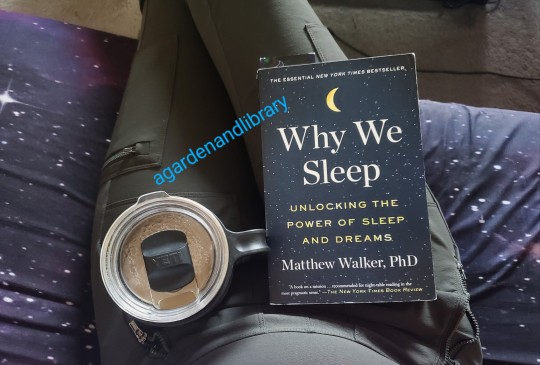
It's been almost 2 months since I started this and I've read 15 other books in the meantime, whoops.
6 notes
·
View notes
Text
Guys why aren't we making Scar a red panda hybrid
#HE THROWS HIS HANDS UP LIKE A RED PANDA#WE ALL KNOW THIS#COME ON#DO YOU UNDERSTAND HOW FUNNY AND CUTE IT WOULD BE#imagine a hermit sneaking up on his and scar just screams and throws his hands up#like COME ON#THATS PERFECT#PLUS#HE GETS A CUTE TAIL#AND EARS#HAVE YOU SEEN RED PANDAS#THEYRE ADORABLE#and also probably my favorite animal#BUT COME THEYRE SO CUTE#(i should be sleeping cause i literally get up in less than 40 minutes but i woke up an hour ago and IVE BEEN TRYING TO SLEEP AGAIN#BUT THE SLEEP WONT COME#I HAVE WORK. WHY CANT I SLEEP#gtws#goodtimeswithscar#hermitcraft#stiff talk
3K notes
·
View notes
Text

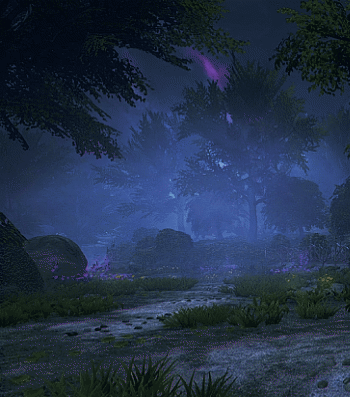
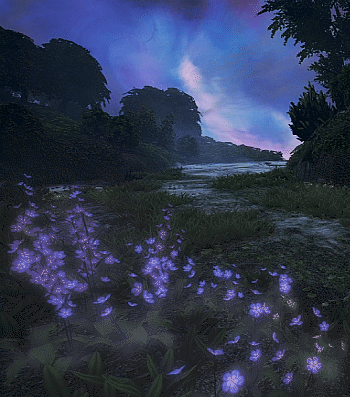
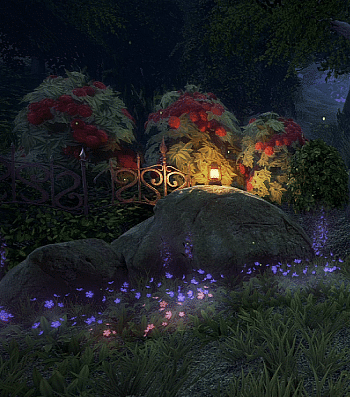

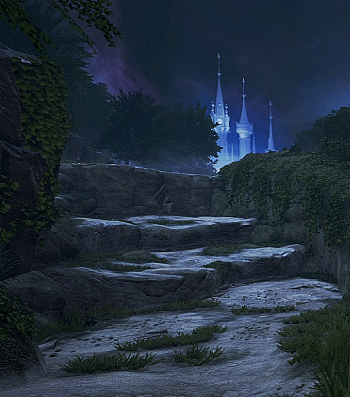
Kingdom Hearts 0.2 Birth by Sleep - A Fragmentary Passage - Main Road
#kingdom hearts 0.2 birth by sleep a fragmentary passage#kh0.2#main road#castle of dreams#realm of darkness#scenery#my gif#i suppose this area is still within the same world as my last set but i felt it deserved its own post#because it's so beautiful here i love the atmosphere#some areas are so lush with pretty flowers and fireflies and a few lanterns scattered around that make the place feel lived in#while other areas are covered in an eerie fog with distorted structures and an uncanny sky shimmering above#i spent... a very long time staring at all of the foliage. nomura can you put a first person view camera back into these games please#should we question why the people who live in these worlds aren't sent to the realm of darkness but the fireflies are?#what'd they do to deserve that
459 notes
·
View notes
Text

red lion wizard !
#pokemon#swsh#champion leon#wizard leon! one of em!#chose to color this one foolhardy style lmao. well it is done. I did Minimum cleaning up#this set is. well Im gonna draw the design sketch like with the toy doctor#but yeah the Other name for this one is 'wizard of performance'#which. uh. yeah there u go#Im actually flipfloppin between thinking this looks fine and feeling like I fucked up big time.... idk why. probably bc I put a h#uge splash of almond flavoring into this tea instead of like. two drops. like I wanted to#its literally like drinking perfume. why is vanilla fine when you add more than a few drops in but almond extract poisons you in real time#like why does a food flavoring smell exactly like something you Shouldn't eat. why is it made like that#well. I will sleep now. and maybe I'll dream. and then I'll know#have a good night lads! we are not immune to propaganda.
717 notes
·
View notes
Text
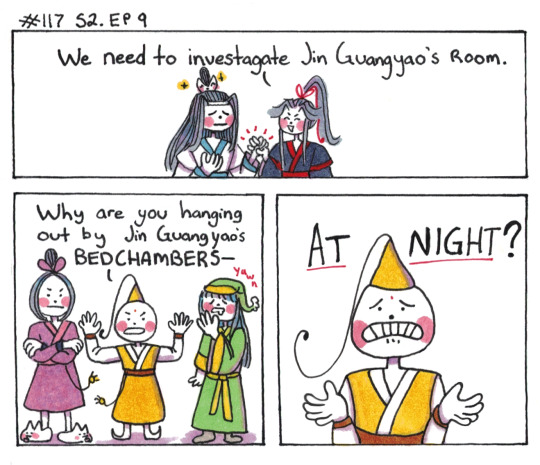
+3 friendship with Jin Ling: He actively tries to dissuade you from further embroiling yourself in the homosexual allegations.
[First] Prev <–-> Next
#poorly drawn mdzs#mdzs#wei wuxian#lan wangji#jin ling#jiang cheng#nie huaisang#For real though it's so sweet how desperate he sounds when trying to save mxy's face.#Jin Ling genuinely likes this uncle! He's let him into his heart!#Why his uncle is so desperate to make his reputation worse is beyond him!!!#The same uncle who has time and time again proven to be genuine in his intentions and has been there for JL in so many ways!#JL wants to return the favour! Alas it is like holding a dog back from eating the onion chips on the ground.#I sure hope nothing betrays jin ling's trust in this new bond!#(and yes I am keeping NHS and JC's sleep wear in the next scenes. For the whimsy)#In other news - LWJ finally gets a little hand hold. Most likely it was a highfive that lasted a little too long.#But it counts okay? To him it counts.#Speaking of: I went sooooo long in life not realizing the 'hee hee let's compare hand sizes' was a flirt move.#I thought people were just genuinely curious about fingers and hands. But no. It's not that. It's a hand hold move.#I'm here for the science and research. You are here to flirt. We are not the same.
897 notes
·
View notes
Text

Somewhat modern day AU? Aka my excuse to do silly social media shenanigans and drawing Seb in a sweater vest? (p.s. that’s Ominis’ peace sign)
#hogwarts legacy#sebastian sallow#sebastian sallow x mc#hogwarts legacy mc#garreth weasley#fanart#oof tell me why I tried so hard on this?#I hate backgrounds with a passion that burns#but it’s so cute look how peaceful they are sleeping#ah another trope I am weak for ‘we fell asleep on each other’#would wizards even have phones?#idk but here#srry Garreth isn’t technically in this but it’s his post so I’m tagging him#ok but social media posts are high key kinda fun to draw#sebastian x mc
2K notes
·
View notes
Text
the way garak looks at bashir as he puts all the clues together at the end of cardassians. the sheer 'look at that little twink go (affectionate, sexual overtones)' energy he manages to convey in the background there as bashir passionately does the presentation of their group project that garak did 80% of the actual work on. immaculate
#star trek ds9#deep space 9#star trek#garashir#elim garak#his lil face journey as they speak to the lady about rugal coming to the orphanage too. adorable. 'it's so over oh we're so back'#also the revelation that garak is high as a kite not only for this but for most of the first two seasons. hysterical#I love him so much already.#'yes yes I'm sure we're ALL very sad about the orphans or whatever. I wouldn't know I haven't experienced a natural emotion in years'#(let's hope he's at least fooling himself at this point)#ALSO also. sisko in his bathrobe in the middle of the night b/c 'so uh dad my unhinged new boyfriend wanted me to ask#if we could borrow the car. no he didn't say why. yeah I'm sure he has a driver's license he was like in the army or something#btw he snuck into my room while I was sleeping and I didn't notice a thing lmao isn't he cool???'#sisko you deal with so much all of the time and there aren't enough medals they could give you for it#bashir going 'tell me what's going on in your head or I stg I'll turn this runabout around'...... yes. yes wonderful
255 notes
·
View notes
Text

What really gets me about this is that we know Buck was staying with Christopher the whole time Eddie was in the hospital and had clothes at the Diaz house, but seemingly he still went home before his shifts just so Chris wouldn't see him putting on the vest.
#evan buckley#911#911 4x14#🥲🥲🥲#I mean why else would he go home for really#when we saw him pack his stuff#and sleep there#and have breakfast there#ugh#my stuff
472 notes
·
View notes